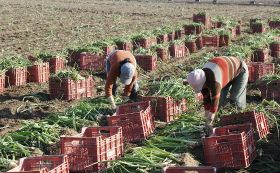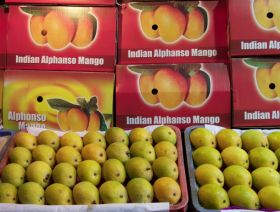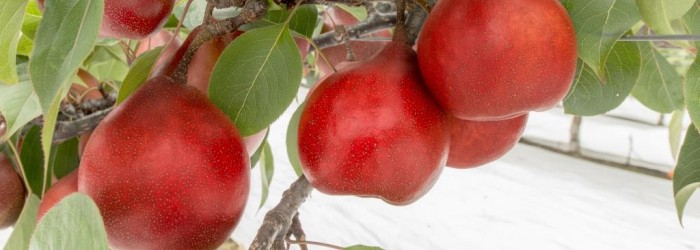Food Manufacturing News
Labour supplier, produce body and leading retailer join forces to give young apprentices hands-on horticulture experience

Sainsbury’s, the British Growers Association (BGA) and Staffline Agriculture have joined together to develop a bespoke intermediate apprenticeship that matches enthusiastic young people within Sainsbury’s diverse supplier base in the horticulture industry.
Through the scheme, apprentices will gain hands-on practical experience within the retailer’s farmer and grower base, working on real issues that face horticulture supply chains throughout the UK.
Rob Honeysett, horticulture manager at Sainsbury’s, said: “With our long history of supporting British farmers we’re always looking for ways to drive the future of British farming. I’m pleased to announce that there are a number of vacancies now being advertised on the National Apprenticeship Services (NAS) website for opportunities at various farms in Lincoln, Cambridgeshire, Norfolk, Kent, Hampshire, Shropshire and West Sussex.
“We’ll be carrying out the initial recruitment and selection process leading onto interviews for successful shortlisted applicants in July.”
Jack Ward, BGA chief executive, said: “Securing the next generation of new entrants is vitally important. The fresh produce industry has a demanding and ambitious agenda involving a wide range of innovation and technological developments. Getting more people into the industry is crucial to the future success of the sector.”
Laura Savage, operations manager for Staffline Agriculture, added: “We are confident that the vacancies will attract a lot of interest due to the variety of apprenticeship roles available, and, in all cases, the remuneration being over and above the recommended apprenticeship wage and in some roles above the National Minimum Wage too.
“It’s a golden opportunity for people who are interested in starting a career in the agriculture and horticulture industries but don’t know where to begin. It’s tremendously exciting to be working with British Growers Association and Sainsbury’s growers in developing the programme and delivering the pilot scheme this year.”
The farms employing the apprentices are major suppliers of fresh produce to Sainsbury’s including: Cornerways Nurseries; Vitacress Limited; North Bank Growers; Allpress Farms Limited; Produce World Group; Taylorgrown Limited; Strawson Limited; New Farm Produce Limited; F W Mansfield & Son; J B Shropshire & Sons (G’s); AC Goatham and Thakeham Mushrooms.
Welsh grower Perkin Evans wants the NFU to keep lobbying Brussels to ensure food producers’ tool-boxes aren’t ‘depleted’
Farmers fear Europe is fast becoming an over-regulated environment to operate within, NFU Wales has found.

A new campaign by the union, called ‘Healthy Harvest’, has just been launched in response to concerns that already flat-lining UK crop production will go into further decline if Welsh farmers continue to lose access to key plant protection products.
Statistics show that since 2001, half the plant protection products on the market have been lost, and over the next five years, half of what is left could also disappear from the market owing to overzealous regulation, not backed up by sound science.
“Our toolbox as food producers is becoming increasingly depleted, at the very time we need to be stepping up to the challenge of producing more,” said Perkin Evans, chairman of NFU Wales’s Combinable Crops and Horticulture Working Group at the group’s recent meeting.
He added: “Europe is fast becoming an over-regulated environment for farmers to operate within. We are steadily losing our markets to farmers elsewhere in the world, who have better access to more effective means of crop protection and production.
“With global demand for food heading in only one direction, now is certainly not the time to be taking away the tools that we need to be able to produce disease free, high yielding crops, and we need the same access to safe technology as our competitors if we are to have a productive and competitive sector.
“As more and more products get withdrawn, there is simply not the corresponding level of new products arriving on the market to replace them, and the reality is that European requirements to bring a new product to market have become prohibitively expensive and time consuming, leaving farmers and growers with fewer and fewer products to choose from. To make things worse, many manufacturers are decreasing investment in the European market, partly because it is over-regulated.”
Evans believes that as a union, NFU Wales needs to keep lobbying to ensure that both EU and domestic regulators base the control of plant protection products on sound science; something that includes lobbying the EU to move away from its current hazard based approach, and return to a risk-based process.
Discounter Netto will return to UK this year through £25m partnership between Sainsbury’s and Dansk Supermarked
Sainsbury’s has partnered with Danish retailer Dansk Supermarked to relaunch discounter Netto in the UK.

The joint venture will be trialled in 15 Netto stores to be opened in the UK by the end of 2015, with the first few opening their doors in northern England later this year. If successful, there are plans to roll-out the new format across the rest of the UK.
It will be headed by Morten Mberg Nielsen, ex-managing director of Netto International in Germany who has worked for Dansk Supermarked for 14 years.
The new Netto format, said to be “a complete departure” from the chain’s previous format in the UK, will emphasise fresh food and highlight seasonal products with a “when it’s gone it’s gone” offer. It will also provide Danish bread and pastries from an in-house bakery.
Sainsbury’s and Dansk Supermarked have both invested £12.5 million in the project, and a statement said that as a result of start-up costs, each partner expects a post-tax loss of between £5 and 10 million up to 31 March 2015.
“This joint venture provides a great opportunity for us to gain exposure to the high growth discount market for the first time in partnership with Dansk Supermarked,” said Mike Coupe, Sainsbury’s CEO designate.
“If successful, this trial has the potential to open up a new long term growth opportunity for us complementing our fast expanding convenience, online and non-food businesses, as well as our existing supermarket estate.”
Per Bank, CEO of Netto’s parent company Dansk Supermarked said: “It’s great to be bringing a new twist to the rapidly-growing UK discount sector.
“The discounter experience, operating model and systems of the Dansk Supermarked group, combined with Sainsbury’s UK market insight, property expertise and logistics excellence will help deliver a discounter format we think UK customers will love.”
The UK discount sector is currently worth around £10 billion and is forecast to double in value to approximately £20 bn in the next five years, according to the IGD.
Indian betel linked to Birmingham hospital’s food poisoning case could get an EU ban akin to that for Alphonso mangoes
Another item of fresh produce from India is on the verge of being hit by an export ban.

Betel leaves exported from India have been linked to an outbreak of food poisoning at Birmingham’s Heartlands Hospital, and there have been warnings from the EU that a ban similar to the one imposed on Indian Alphonso mangoes could follow, according to reports on the CNBC news channel in India.
The EU announced last week that Indian betel leaves (often known as ‘paan’, and used for a stimulating and psychoactive preparation combined with areca nut and/or cured tobacco) have been testing positive for Salmonella, and these are now being linked to the outbreak in the Midlands. The EU case is that the leaves themselves have not been treated properly, CNBC reported.
Uday Dholakia, chairman of the National Asian Business Association, told CNBC: “Talking to a lot of the officers, one of the areas they’re looking at are the imported vegetables from India, and paan is one of them.”
Jon Ashworth, MP for Leicester South, said: “The UK government has supported the banning of Alphonso mangoes from India. Now it sounds like they are going to be supporting the banning of paan coming in from India. I think lots of people in Leicester enjoy both the mangoes and the paan.
“I think regulators need to work closely with the business community and exporters in India to sort these problems out quickly because I don’t want to see more Leicester businesses and more UK businesses hit by another ban.”
Warnings of a new ban come following extensive diplomatic efforts to end the mango ban.
Ranjan Mathai, Indian High Commissioner in Britain, told CNBC: “When the ban was initially put in place by an order at the end of March, we were told that this would be effective till the end of 2015. What we have been able to do is to have an agreement that the Food and Veterinary Organisation conduct another inspection another survey a little wider this time of many food products and not just mangoes and they would be examining this.
“That would be brought up to September this year, which provides us the opportunity to have this matter reviewed.”
Food retailer toasts a successful financial year, and also plans to open 40 new stores in 2014, creating 1,250 jobs

Iceland Foods is toasting a successful year of trading after generating group sales of £2.71 billion, up 2.7% on the previous year.
The UK supermarket chain posted the results – largely driven by new store openings and group expansion – through its holding company Topco for the 52-week period to the end of March 2014.
Like-for-like sales in the company’s last financial year, though, were flat, and adjusted EBIDTA fell 10.6% to £202 million, reflecting “major investment for sustainable future growth in the UK and abroad.”
A spokesperson for Iceland Foods also confirmed that the Malcolm Walker-led business is on track to open 40 new stores this year, creating 1,250 jobs in the process.
Walker said: “This has been a year of major investment for Iceland both at home and overseas. In the UK we accelerated our expansion programme with the opening of 46 new stores and also rolled out our online shopping offer to 280 stores.
“Overseas we began to serve important new export markets in South Africa and the Middle East, acquired the formerly franchised Iceland stores in the Republic of Ireland and opened two additional stores in the Czech Republic. We were also delighted to regain our title as the Best Big Company To Work For in the UK.”
During its most financial year, the business reduced its net debt from £875.2 million to £805.1m.
At year’s end, Iceland Foods operated 844 stores in the UK and internationally, compared to 793 a year earlier, and currently boasts a workforce of 25,000 people.
Australasian fresh produce company signs deal with Prevar to grow and market new trademarked pear cultivar

New Zealand-based topfruit breeder-marketer Prevar has signed an agreement with the Australasian company Freshmax to develop sales of PremP009, a new pear set to be grown in Australia and marketed globally as Piqa Boo.
Bred by Plant & Food Research, the new cultivar is the first of a number of new cultivars expected to be released in the coming years and sold under the Piqa brand.
It combines characteristics from European, Japanese and Chinese pears, apparently giving the fruit a crisp, juicy texture and refreshing flavour, as well as exceptional storage and shelf-life.
Large-scale plantings are due to begin in Australia and New Zealand this year, with the first commercial harvest expected in 2016.
Freshmax Group chief executive Ross Kane welcomed the deal: “We believe there are excellent commercial opportunities for these new fruits in Australia and in Asian export markets, and are excited for their future.”
According to Kane, the pear category is in need of new and better varieties, and the fruit emerging from the Piqa programme could be a “significant catalyst” for that rejuvenation.
“The Piqa Boo brand cultivar is visually striking in both colour and shape and has a very appealing crisp texture and flavour, resulting in a very broad appeal to consumers,” he added.
In good shape
Piqa Boo has a short pyriform shape, bright block red colour and small brown lenticels – the small pores seen on the surface of many apples and pears that give them a distinctive mottled look.
It is also said to have exceptional storage and shelf-life, developing a flavour characteristic of the Williams pear variety during coldstorage and offering the same ready-to-eat convenience of apples.
“These fruits should also be well received by younger consumers,” said Andrew Maughan, national business manager for Holman Fresh, part of Freshmax and licence manager for the group.
“We have already assembled a very committed and entrepreneurial group of pear growers to commence the planting of this selection. Anyone else who wishes to participate in Australia should contact me.”
For Prevar, teaming up with Freshmax offers it a great opportunity to make its vision for Piqa a reality, suggested chief executive Brett Ennis.
“The essential brand message for Piqa fruit is ‘delightfully exotic’, which captures the best elements of western and eastern pears fused together in this new range of fruits,” he said. “We look forward to the range of opportunities this new brand will create.”
The agreement with Freshmax represents a major step in terms of establishing a supply base for Piqa Boo, with Prevar having already signed an exclusive deal with UK importer Worldwide Fruit to sell its new range in the country.
British Flowers Week, which showcases the best product and floral design our island has to offer, starts today.

The nation may be glued to the World Cup, but there’s another reason to be cheering on the UK this week, and that’s thanks to the growing list of fashion-forward florists that are taking the industry by storm.
British Flowers Week, championed by New Covent Garden Flower Market, is a celebration of the growers and designers working hard to promote UK cut flowers.
Over the next five days florists such as Okishima & Simmonds, McQueens, Euphoric Flowers, Hybrid Flowers, and Simon Lycett will reveal specially commissioned designs using only British product.
A NCGM spokeswoman said despite UK sales of cut flowers being worth some worth £2.2 billion, it is estimated that just 10% are grown in the UK.
“Many British growers are fighting international competition with rising costs and higher land values making it even harder to compete,” she added.
“But now, British flowers and foliage are enjoying a long-awaited resurgence in popularity. Buyers are increasingly demanding more locally grown produce to celebrate the seasons and support British growers. Often scented, British flowers have a natural charm, beauty and just-picked freshness that make them the florist’s favourite.
“New artisan growers have sprung up around the country, and campaigners such as Rachel de Thame, Sarah Raven, the Flowers from the Farm movement and New Covent Garden Flower Market, are leading the call to support British cut flower growers.”
For more information on events go to www.newcoventgardenmarket.com
McCartney-backed Meat Free Monday welcomes its fifth anniversary by celebrating diverse support and launching new merchandise

Meat Free Monday, the global celebrity-backed campaign to promote one day of not eating meat a week, is celebrating its five year anniversary today.
The campaign, which is headed by Paul, Stella and Mary McCartney, is celebrating the occasion by celebrating the diversity of its global supporters and launching new tee shirts.
It has also started an Instagram page to encourage followers to post creative meat-free meals, using the hashtag #MeatFreeMonday.
Since its launch in 2009 the campaign has gained global support from the Norwegian military, the Croatian ministry of Agriculture, the Hong Kong airport authority and Kuwait’s ministry of health.
It is known in over 35 countries and 23 languages, including Lunes Sin Carne in Mexico, Meatless Monday in the USA and Luntiang Lunes in the Philippines.
Ex-beatle and Meat Free Monday campaigner, Paul McCartney, said: “Thank you to everyone who supports the campaign. Eating more fruit and veg, and less meat, is good for our health and good for the planet. With diet-related diseases on the rise, Meat Free Monday is more important now than ever.”
McCartney is joined in the project by his two daughters, photographer Mary and high-fashion designer Stella.
It has also been backed by a host of celebrities including Gwyneth Paltrow, Leona Lewis, Kevin Spacey, Jamie Oliver, Joanna Lumley and Sir Richard Branson.
“Happy fifth birthday Meat Free Monday! It’s brilliant to see so many people embracing MFM and enjoying a break from meat at least once a week. I have noticed meat-free food options are more widely available than ever – flavourful and imaginative,” said Mary McCartney.
Stella McCartney took the chance to thank supporters of the campaign and emphasise the achievability of not eating meat once a week.
She said: “One day a week without meat is achievable for us all and we know you can do it to have better health and a better environment.”
The Meat Free Monday campaign was founded as a result of increasing evidence to suggest that eating meat is not environmentally or economically sustainable.
It uses statistics such as the Food and Agriculture Organization (FAO)’s estimation that global meat production accounts for nearly 15% of all greenhouse emissions.
The campaign has focused on both consumer and wider political aspects: it has published a Meat Free Monday Cookbook and has issued a plea with the European Parliament to take the issue of meat reduction seriously.
Group D: Mark Newton of Freshtime goes head to head with Federico Milanese of Centro Servizi Ortofrutticoli
Fruitnet.com’s partner publications FRESH PRODUCE JOURNAL (FPJ), EUROFRUIT, ASIAFRUIT and AMERICAFRUIT have teamed up to publish a series of special interviews to coincide with the FIFA World Cup, featuring a member of the fresh produce industry from each of the 32 nations involved in the tournament.

Today, it’s Mark Newton from English company Freshtime and Federico Milanese of Italian firm Centro Servizi Ortofrutticoli, ahead of their national teams’ Group D clash later today (14 June):
What is your firm’s world-beating service or product?
Mark Newton: Our goal is to turn quality produce into delicious salads, snacks and deli fillers. We take extra time to make sure we use the freshest ingredients and we always score top marks from our customers!
Federico Milanese: We have lots of excellent products, but one of our world-beaters is kiwifruit, for which we are the leader in terms of production. We’re promoting kiwifruit to an increasing number of markets around the world in regions even further afield such as Asia, North America and the Middle East.
What does the World Cup mean to people in your country?
MN: Nearly half a century after we last won a World Cup England fans have learned to temper their expectations. But we all love a big tournament and when we English get the chance to fire up the barbecue and watch a big match sales of salads tend to go through the roof!
FM: For Italy, the World Cup is a unique event and it has a unique impact on the market. It’s very important in terms of food consumption and, although I haven’t noticed much so far in terms of promotional tie-ins for fresh fruit and vegetable products, there could conceivably be a greater level of interest for exotic produce including Brazilian fruit. During the World Cup there’s usually a significant increase in the volume of fresh convenience products consumed.
How do you think your national team will fare in Brazil?
MN: We’re in a tough group and the climate won’t help us, but Roy Hodgson has selected a fresh young squad with some exciting attacking talent so there’s room for cautious optimism. Prediction: Finish second in group, and then reach the quarter-finals before losing to hosts Brazil.
FM: I’m more concerned about the first group stage than I am about the latter stages of the tournament. Assuming the Azzurri make it to the second stage, we could do very well.